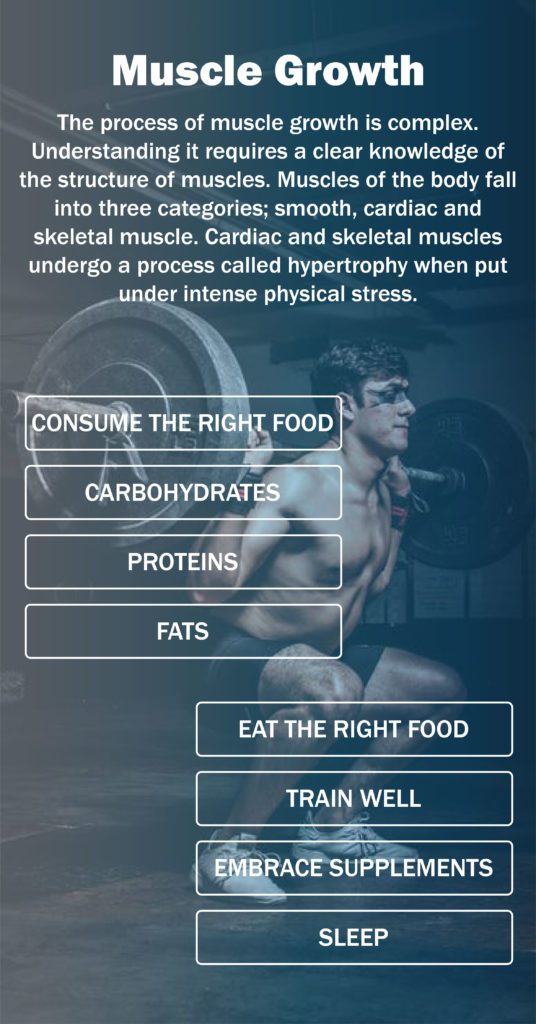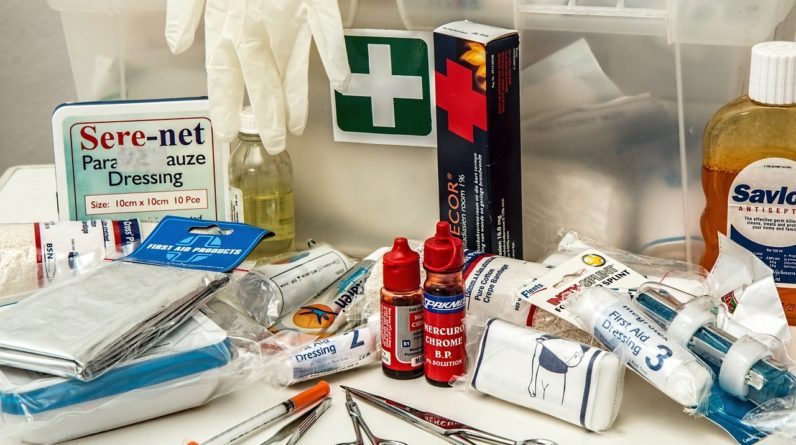
The process of muscle growth is complex. Understanding it requires a clear knowledge of the structure of muscles. Muscles of the body fall into three categories; smooth, cardiac and skeletal muscle. Cardiac and skeletal muscles undergo a process called hypertrophy when put under intense physical stress. Hypertrophy is the main mechanism through which skeletal muscles grow. During hypertrophy, muscle cells grow in size. Moreover, intercellular spaces increase causing the overall enlargement of the muscle. The process requires a good combination of nutrients and training for optimal growth. Nonetheless, getting the basics right is enough to stimulate and sustain muscle growth. Here is how.

Consume the right food
Nutrients are central to muscle growth. Growth is the process through which cells increase in size and number. The process requires nutrients to generate energy and build the structural components necessary for growth. Having the right combination of nutrients ensures growth is achieved. The nutritional requirements vary with the intensity of training and the amount of growth to be achieved. For more intensive work outs, more nutrients are required. Nonetheless, a balanced diet is still important for normal physiologic functioning that provides the foundation for muscle growth. There are some important nutrients you need on your menu for maximum muscle growth.
Carbohydrates
Carbohydrates are crucial macronutrients and a primary source for energy. Removing carbohydrates from a diet will diminish your athletic performance and the effectiveness of your workout. This is as a result of depleted glycogen reserves and inadequate energy. Carbohydrates ensure muscle cells have the energy necessary for growth. However, consumption should be limited to good quality carbohydrates found in fruits, grains and other sources. Nutrient-dense carbohydrates are the ideal source of energy for muscle growth.
Proteins
The support system of muscle tissue is reliant on amino-acids, the building blocks of proteins. Proteins aid in cellular function and muscle repair. Considering muscle repair is crucial in the process of hypertrophy, proteins play a key role in muscle growth. They are the substrates for muscle metabolism and anabolism. The amino acid supply must be adequate for muscle growth lest muscle tissue breakdown begins. At least 10%-35% of the caloric intake should be from proteins.
Fats
“Eating fat makes you fat” is a myth that has led many people to mistakenly avoid fat with the intention of building muscle. Healthy fat enhances hormonal function. Testosterone is a hormone that stimulates muscle growth and fat increases its availability. Moreover, fats are necessary for the absorption of vitamin A, D, E and K. These vitamins maintain the normal physiologic functions of muscle cells. Fat intake should meet the physical demands of intense workouts. Therefore, eating the right amount of healthy fat is important for muscle growth.
Eat the right food at the right time
Eating the right food is not enough. You must eat the right food at the right time to get the most from your training and enhance muscle growth. Even distribution of meals throughout the day is important for a constant supply of nutrients to the body. In addition to the regular meals, pre-workout and post-workout meals have to be consumed within hours of training. This ensures adequate energy supply for efficient training and good recovery after working out. A combination of large meals and small meals is effective in stimulating and maintaining adequate muscle growth.
Train well
Most people do not know how to work out for muscle growth. Different training regimens are designed to meet different objectives. Strength training enhances muscle strength but doesn’t necessarily cause muscle hypertrophy. On the other hand, hypertrophic workouts stimulate muscle growth. A combined regimen is good for those who seek muscles and strength. Moreover, training should involve all muscle groups for even growth of skeletal muscles. A schedule can be followed to divided the muscle groups into sets and ensure every group is attended to. Professional trainers are skilled at identifying and planning work out schedules that are suited for a particular individual. Therefore, going to the gym is good but getting a trainer is better.
Embrace supplements
While on busy schedules, it is difficult to meet the nutrient requirements for muscle growth through regular meals. Supplements are a good alternative for constant nutritional supply. They are convenient and cheap. Gold Standard Whey is one of the most popular supplements and offers an unmatched supply of proteins and special amino acids. Most of the supplements can be mixed into shakes while others are prepared as bars, like the Quest Bars which have high-quality protein and fibre. Supplements are not a replacement of food but a convenient addition for quick nutritional supply.
Sleep
People often work out so hard that they forget to sleep. Sleep is important. It facilitates recovery and enhances focus during training. Getting enough sleep is important for adequate muscle growth.
Read Also:





